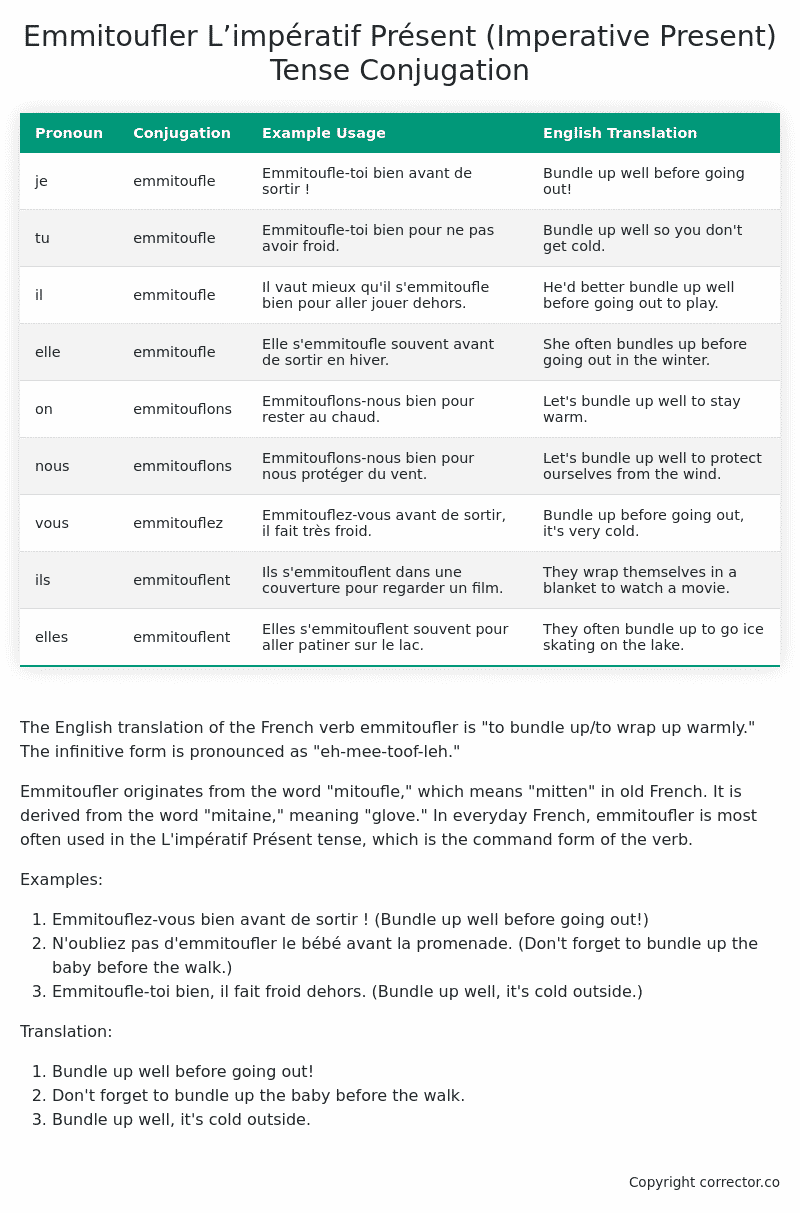L’impératif Présent (Imperative Present) Tense Conjugation of the French Verb emmitoufler
Introduction to the verb emmitoufler
The English translation of the French verb emmitoufler is “to bundle up/to wrap up warmly.” The infinitive form is pronounced as “eh-mee-toof-leh.”
Emmitoufler originates from the word “mitoufle,” which means “mitten” in old French. It is derived from the word “mitaine,” meaning “glove.” In everyday French, emmitoufler is most often used in the L’impératif Présent tense, which is the command form of the verb.
Examples:
- Emmitouflez-vous bien avant de sortir ! (Bundle up well before going out!)
- N’oubliez pas d’emmitoufler le bébé avant la promenade. (Don’t forget to bundle up the baby before the walk.)
- Emmitoufle-toi bien, il fait froid dehors. (Bundle up well, it’s cold outside.)
Translation:
- Bundle up well before going out!
- Don’t forget to bundle up the baby before the walk.
- Bundle up well, it’s cold outside.
Table of the L’impératif Présent (Imperative Present) Tense Conjugation of emmitoufler
| Pronoun | Conjugation | Example Usage | English Translation |
|---|---|---|---|
| je | emmitoufle | Emmitoufle-toi bien avant de sortir ! | Bundle up well before going out! |
| tu | emmitoufle | Emmitoufle-toi bien pour ne pas avoir froid. | Bundle up well so you don’t get cold. |
| il | emmitoufle | Il vaut mieux qu’il s’emmitoufle bien pour aller jouer dehors. | He’d better bundle up well before going out to play. |
| elle | emmitoufle | Elle s’emmitoufle souvent avant de sortir en hiver. | She often bundles up before going out in the winter. |
| on | emmitouflons | Emmitouflons-nous bien pour rester au chaud. | Let’s bundle up well to stay warm. |
| nous | emmitouflons | Emmitouflons-nous bien pour nous protéger du vent. | Let’s bundle up well to protect ourselves from the wind. |
| vous | emmitouflez | Emmitouflez-vous avant de sortir, il fait très froid. | Bundle up before going out, it’s very cold. |
| ils | emmitouflent | Ils s’emmitouflent dans une couverture pour regarder un film. | They wrap themselves in a blanket to watch a movie. |
| elles | emmitouflent | Elles s’emmitouflent souvent pour aller patiner sur le lac. | They often bundle up to go ice skating on the lake. |
Other Conjugations for Emmitoufler.
Le Present (Present Tense) Conjugation of the French Verb emmitoufler
Imparfait (Imperfect) Tense Conjugation of the French Verb emmitoufler
Passé Simple (Simple Past) Tense Conjugation of the French Verb emmitoufler
Passé Composé (Present Perfect) Tense Conjugation of the French Verb emmitoufler
Futur Simple (Simple Future) Tense Conjugation of the French Verb emmitoufler
Futur Proche (Near Future) Tense Conjugation of the French Verb emmitoufler
Plus-que-parfait (Pluperfect) Tense Conjugation of the French Verb emmitoufler
Passé Antérieur (Past Anterior) Tense Conjugation of the French Verb emmitoufler
Futur Antérieur (Future Anterior) Tense Conjugation of the French Verb emmitoufler
Subjonctif Présent (Subjunctive Present) Tense Conjugation of the French Verb emmitoufler
Subjonctif Passé (Subjunctive Past) Tense Conjugation of the French Verb emmitoufler
Subjonctif Imparfait (Subjunctive Imperfect) Tense Conjugation of the French Verb emmitoufler
Conditionnel Présent (Conditional Present) Tense Conjugation of the French Verb emmitoufler
Conditionnel Passé (Conditional Past) Tense Conjugation of the French Verb emmitoufler
L’impératif Présent (Imperative Present) Tense Conjugation of the French Verb emmitoufler (this article)
L’infinitif Présent (Infinitive Present) Tense Conjugation of the French Verb emmitoufler
Struggling with French verbs or the language in general? Why not use our free French Grammar Checker – no registration required!
Get a FREE Download Study Sheet of this Conjugation 🔥
Simply right click the image below, click “save image” and get your free reference for the emmitoufler L’impératif Présent tense conjugation!

Emmitoufler – About the French L’impératif Présent (Imperative Present) Tense
Usage
Giving commands
Making requests
Offering advice
Expressing desires
Conjugation Formation
Interactions with other tenses
Want More?
I hope you enjoyed this article on the verb emmitoufler. Still in a learning mood? Check out another TOTALLY random French verb conjugation!


